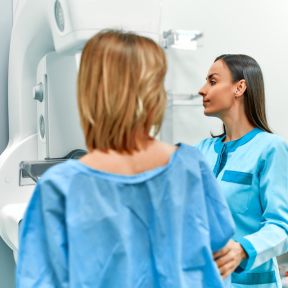KEY POINTS-
- We believe deeply in cancer screening, the only thing we can do about our most feared disease.
- Advocates like doctors, hospitals, and tech companies, point to the benefits of screening, but not the harms.
- A new study looks finds that, in terms of net life years saved, common cancer screening provides no benefit.
It seems almost impossible to believe, and even after you read this post you may say to yourself, “That just can't be true." But a major study just published in JAMA Internal Medicine finds that the most common forms of cancer screening do not produce any net life years saved for the population as a whole. Mammograms and PSA tests and colonoscopies and sigmoidoscopies (that only examine the lower part of the colorectal tube) and fecal occult blood tests (do-it-yourself at-home sampling you send to a lab) do save some lives, the study found. (The study didn't include Pap smears for cervical cancer.) But when you compare that against all the years of life that are lost because of the harmful side effects of screening, which most people never think about, and advocates of screening all but ignore, it comes out as a wash. In terms of net life years saved for the whole population that screens, compared to people who don't screen, cancer screening has no benefit.

No net benefit?! You may say, "But my doctor says I should screen. All the experts say we should screen. They say catching cancer early when it’s more treatable is best. I know so many people who screened and found an early curable cancer. Screening saved their lives.”
Indeed, I have treasured friends for whom that’s true. But how many of you know someone whose early cancer was found, and treated, but the treatment killed the patient—an infection after prostate surgery or a mastectomy, a heart attack or stroke after lung surgery, or bleeding that couldn't be stopped as a result of a polyp removed during a colonoscopy? Those happen too, and although such events are rare, it turns out that so are lives actually saved by screening. Mammography, for example, saves only two lives per thousand people screened, over ten years. PSA tests for prostate cancer have not been found to save any lives compared with no screening at all. So when you add everything up, as this study did, and compare the years of life saved because screening caught a cancer that was cured against the years of life lost from all the other sorts of causes of death screened patients suffer, it comes out as a wash.
And then there are the tens of thousands of people who don’t die but suffer the serious side effects of treatment for overdiagnosed cancers that more perceptive screening technologies can now find, tiny growths that meet the cellular definition of cancer but which would never go on to cause the person any harm: low-grade DCIS breast cancer, slow-growing prostate cancer, and tiny microtumor thyroid and lung cancers. This study didn’t even account for that harm.
This all runs so deeply against popular belief. Most religions would be happy to enjoy the kind of faith that we place in cancer screening. It is, after all, the one thing we feel we can do to have at least some control over the disease we fear more than any other. One study found that people want cancer screening even when they know it won’t help, and might harm them. Participants were told about a cancer screening test (mammography for women, PSA (prostate specific antigen) testing for men) and were warned that "years of research have unquestionably shown that the test does not extend life or reduce the chance of death” and that the test could "lead to unnecessary treatment"; 51% wanted that screening anyway.
There are two parts to this problem. First, that we fear cancer so deeply, more indeed than any other disease, even heart disease, which kills 10% more Americans each year. Second, advocates of screening, including the doctors and hospitals and technology companies that profit from screening and the expensive cancer care it leads to, appeal to our fear but only provide us with part of the screening story: the rosy, "screening saves lives” part. Our blind belief in the benefits of cancer screening, due to ignorance of its potential harms, are out of date. These outdated beliefs are doing us real, sometimes fatal harm. Studies like this new one are part of a growing effort to reduce that cost.
In the name of public health, so much more is needed. Advocates in the fight against cancer, honorable as they are, have to be more honest and open about screening's costs as well as its benefits. Few currently are. As hard as it will be, so must the enormous health care industry that profits from not just from cancer screening but the expensive cancer care screening leads to. Otherwise they are doing real harm.
And our doctors have to be more forthright with us. They have to give us not just what we want—screening—but all of the information we need to make a fully informed choice about whether to screen. Which is precisely what the authors of this study call for: “…organizations, institutions, and policymakers who promote cancer screening tests by their effect to save lives may find other ways of encouraging screening. It might be wise to ( ) dispassionately inform interested people about the absolute benefits, harms, and burden of screening tests that they consider undertaking.”
The whole story about cancer screening will help us all make the healthiest choices. We’re not getting that whole story yet.


